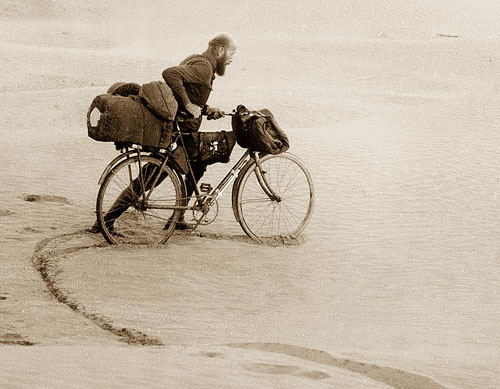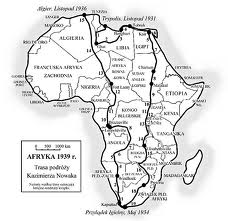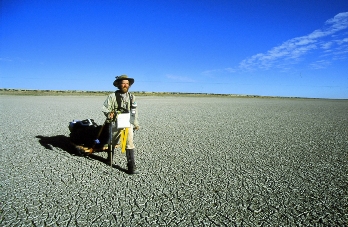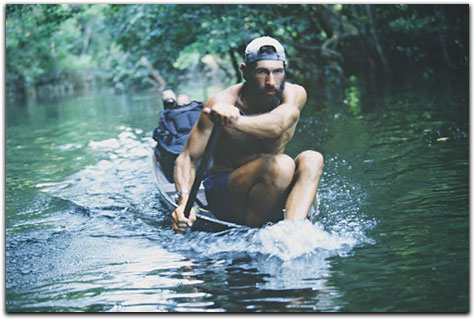Like most of you, I have my travel‘s "Guru". Kazimierz Nowak, Jon Muir and Mike Horn are models of courage, passion and curiosity to know the world. The most important – the perseverance to achieve the goals. I am full of admiration and recognition for them.
I can’t and I don’t want to compare myself to my “gurus”. However there is possible just a bit portion of identification. Travelling passion, exploring the unknown and desire to learn and try, it's what pushes us into the world. Their achievements are inspiring and motivating.
Sport aspect of their expeditions - combine the physical endurance while traveling impresses me too. It's far better to reach the remote village on foot (or bike) with a backpack on our shoulders after an epic or long term journey, rather than drive there by car full of tourists. We receive the situation differently, as well as our local hosts. Moreover, I like when the trip begins and ends in an important geographical points (exp. capes), since it must be a final destination when it comes to long-term effort - the matter of motivation to continue down the road.
Sometimes the media describe my gurus as 'mad'. I completely disagree with that. They just had dreams and pursue for their fruition. They were aware of the enormity of the project and they’ve prepared for it sensational. They have done as much as their financial resources and imagination allowed, but everything within the limits of common sense. True, they paid a high price for it (separation from the family and health destruction), but I hope they never regret it.

 My first hero is Kazimierz Nowak, a Pole. In the 30s of the last century he took his heavy steel bike and set off to conquer Africa. Started from North Africa he found himself just after 30 months on the opposite side of the continent. From there he went back, this time on the west coast, without good maps or knowledge of local dialects. In addition to riding a bicycle he tried horse riding, boat rafting on Congo River, camel caravan across the Sahara. He finished his odyssey after 5 years!
My first hero is Kazimierz Nowak, a Pole. In the 30s of the last century he took his heavy steel bike and set off to conquer Africa. Started from North Africa he found himself just after 30 months on the opposite side of the continent. From there he went back, this time on the west coast, without good maps or knowledge of local dialects. In addition to riding a bicycle he tried horse riding, boat rafting on Congo River, camel caravan across the Sahara. He finished his odyssey after 5 years!
He not only travelled, but also interestingly written. A few years ago, Lukas Wierzbicki gathered up his reports from the “Poznan Newspaper” and published a book. This way I first heard about the great explorer, a fantastic reporter, I saw already non-existed world on his photos. The journey also changed his political vision, when he saw how colonialist’s countries conquered the land and treat the locals - he has become an active opponent of colonialism after returning to Poland.
In my opinion it is impossible to repeat this trip. What I mean, it is possible to ride a bicycle through continent,  but the circumstances and progress of Africa 80 years later is a different story. Some examples:
but the circumstances and progress of Africa 80 years later is a different story. Some examples:
1. technically - heavy massive (steel) bike without speeds and heavy camping equipment
2. roads and signs - literally no paths or uncomfortable loose gravel surface (especially after a rainfall), dozens of forks, lack of good detailed maps (not mention about cycling computer or GPS)
3. language - even if Kazimierz Nowak has known foreign languages, often local people didn’t use them. Now the communication with the locals is much easier
4. wild animals – nowadays there are hip less of them and they are closed in the national parks (no bike access), but before they were a real danger for a solitary traveller
5. white man in Africa - probably the only Kazimierz Nowak’s advantage over the current traveler. In the 30's “whites” were "untouchable". But on the other hand, where the colonists had not arrived yet, "savages" were unpredictable. Today, white person is often an opportunity for robbery or stealing the stuff.
Kazimierz Nowak’s relay route started in 2009. It's organized by people who were impressed by the history of our countryman. Relay is set to end after two years, just look at the website www.AfrykaNowaka.pl

My second "guru" is Australian Jon Muir. He is another example of great ambition. At age of 16 he has seen a movie about Mt. Everest expedition – he quit the school and did everything to become a mountaineer. A decade later he reached the highest mountain in the world – solo and by a new route! He has also reached the both poles and made a nearly two-month solo sea kayaking trip along the coast of Cape York.
 However his greatest adventure was a lonely traverse across Australia. The originality of his expedition is not just about to cross the continent, but also the form of doing that - the trip was completely unsupported, without any resupplies on the way. He carried a rifle and a fishing rod, he gathered plants, cooked what he has found or hunted, he made salty water drinkable. As if this is not enough for you, he did not use any electronic navigation systems (GPS), carried only a compass and maps.
However his greatest adventure was a lonely traverse across Australia. The originality of his expedition is not just about to cross the continent, but also the form of doing that - the trip was completely unsupported, without any resupplies on the way. He carried a rifle and a fishing rod, he gathered plants, cooked what he has found or hunted, he made salty water drinkable. As if this is not enough for you, he did not use any electronic navigation systems (GPS), carried only a compass and maps.
On the walk from Port Augusta on the Southern Ocean coast to the village of Burketown in the Gulf of Carpentaria he took a dog with him (dog had been poisoned at the end of the trip). He pulled two wheel cart with all equipment, total of 122 kg weight. He was starting this adventure four times, as weather and equipment conditions have stopped his previous journeys. It wasn’t successful until the fourth attempt. He made this 2.500 km march within 128 days (four months).
I recommend his book and movie of the same title: "Alone Across Australia". For more information visit www.sharkisland.com.au

The third amazing man is Mike Horn, born in South Africa. For him everything is simple, it is just matter of trying. He is modest, doesn’t make his adventures as the best one, although they deserve it. When he talks, I can see the passion in his eyes.
He wanted to go to the Summer Olympics Games, but in ‘70/80s South Africa has been banned from the international arena for the radical apartheid government. Instead he was sent to the war in Angola. He survived and learned a lot. Then he fled SA and Switzerland becomes his new home. As South African he couldn’t find a job, until finally someone allowed him to wash dishes in the kitchen. As soon as winter came he had learned how to ski, and after three weeks he becomes the ski instructor! Then he became white water rafting and paragliding instructor, and over time the extreme sports have become his full-time job. He is a world record holder in highest descent of a waterfall with a hydrospeed (22 meters).
 His first great adventure was traverses from the South America’s Pacific Coast to the mouth of the Amazon River on the Atlantic Coast. It was solo adventure without any support from outside and it was just 10 days after he broke his knee. First he climbed the Andes, and then paraglide to the source of the Amazon River. He jumped into the huge rapids on his body board. The cataracts have crashed his knee a second time. He had no choice and had to swim further, as it was hundreds of kilometers from the civilization. He lived in the water and after 6 months he had reached the salty Atlantic waters.
His first great adventure was traverses from the South America’s Pacific Coast to the mouth of the Amazon River on the Atlantic Coast. It was solo adventure without any support from outside and it was just 10 days after he broke his knee. First he climbed the Andes, and then paraglide to the source of the Amazon River. He jumped into the huge rapids on his body board. The cataracts have crashed his knee a second time. He had no choice and had to swim further, as it was hundreds of kilometers from the civilization. He lived in the water and after 6 months he had reached the salty Atlantic waters.
Then he came up with another fantastic idea. He wanted to circumnavigate the world along the equator. He just had to learn how to sail. A few months later he took off from Gabon and accidentally he broke the world record of the fastest solo crossing the Atlantic Ocean. Then he crossed the Amazon jungle, but he was bitten by the poisoned snake. He gave himself a serum and survived. He changed the target of his trip - his priority was to stay alive. But the hardest and saddest it is Mike's experience that the greatest danger in the journey is not a jungle, water, fire, avalanches, crevices or wild animals. The worst and most dangerous are people. In Colombia he entered the land that belongs to the drug cartels - he felt that someone has power over him. He had luck that they believed in his story (he carried his publications in magazines) and let him continue his trip. Then he climbed the Ecuador five-thousand meter high summits and ride down by bike to the Pacific Ocean. Then he crossed by yacht another ocean, but the Indonesian islands greeted him with gun shots - the Civil War. He could manage even those difficulties and finally he stood on the African continent. The last part of this journey was a traverse the Black Land. He had enough experience in the jungle, and Africa was his home continent. This time the Congo Democratic rebels took him hostage. When he finally was released he arrived without any problems to the Gabon coast, which ended his “Latitude zero” odyssey after 17 months. It is a world record for me , "unbeatable” concept and performance.
During the attempt to reach the North Pole (as usual alone, without any support from outside, without using any engine or dog sled) when the target was close, his boot fastener released. At temperatures around 50 degrees below zero this is a real danger, as cold was getting inside to the foot. The only option he had it was to get off the gloves and fixed the footwear. The operation to complete the task took him around 45 seconds, however, he frostbites his fingers. Over the next few days Mike did not tell anyone about this accident (satellite communications). But when his fingers were still black, the gangrene and possibility of hands amputation scared him enough. He understood that conquered the North Pole for the hands price is not worth it. He called for help. For the first time the nature defeated him. He was lucky and lost only the fingertips. A few years later, along with Norwegian explorer Borge Ousland, he reached the North Pole in the winter, as the first men in the world arrived there without any sunlight.
 His another interesting idea was to circumnavigate the North Arctic Circle. By boat and on foot (or ski), a non-stop over two years trip he covered 20,000 km in freezing zones of Norway, Greenland, Canada, Alaska and Russia. He had been there also for two winters, during the lack of natural light and extreme low temperatures. Once he had an accident - fuel stove exploded in his tent and he lost almost all warm equipment. Miraculously he had built the iglo and had survived two days without the proper shelter. He called by satellite phone for a new equipment and he could continue the expedition! When he talks about this expedition, Mike Horn said once: "sailing among the icebergs, high waves, strong winds, freezing everything on the boat - all this makes navigation very ...." - what verb would you expect? Most people probably would say "difficult, tiring, dangerous, risky etc." and, they would be right. But Mike emotionally described it "interesting". Not huge difference, but with details like that he has gained an extra sympathy from me.
His another interesting idea was to circumnavigate the North Arctic Circle. By boat and on foot (or ski), a non-stop over two years trip he covered 20,000 km in freezing zones of Norway, Greenland, Canada, Alaska and Russia. He had been there also for two winters, during the lack of natural light and extreme low temperatures. Once he had an accident - fuel stove exploded in his tent and he lost almost all warm equipment. Miraculously he had built the iglo and had survived two days without the proper shelter. He called by satellite phone for a new equipment and he could continue the expedition! When he talks about this expedition, Mike Horn said once: "sailing among the icebergs, high waves, strong winds, freezing everything on the boat - all this makes navigation very ...." - what verb would you expect? Most people probably would say "difficult, tiring, dangerous, risky etc." and, they would be right. But Mike emotionally described it "interesting". Not huge difference, but with details like that he has gained an extra sympathy from me.
He tried other things, because he constantly was seeking for a new challenges. Not all projects were fully successful – during one expedition he reached without oxygen “only” two 8-thousand meters summits, and he planned four of them. Not too much talking but action can be an inspiration for everyone.
Now, during his four-year expedition around and across the world, he is promoting environmental protection. On the board of his yacht "Pangea" he is hosting youth visitors from all around the world, showing them our beautiful planet by organizing the unique attractions. He does things for others too, not only for himself.
I recommend his website www.mikehorn.com , and other trips can be also watched on YouTube